NCERT CBSE for Class 10 Maths Chapter 2 Polynomials Important Questions
Polynomials Class 10 Important Questions Very Short Answer (1 Mark)
Question 1.
If the sum of zeroes of the quadratic polynomial 3x2 - kx + 6 is 3, then find the value of k.
Year of Question:(2012)
Solution:
Here a = 3, b = -k, c = 6
Sum of the zeroes, (α + β) = −b/a = 3 ...(given)
⇒ −(−k)/3 = 3
⇒ k = 9
Question 2.
If α and β are the zeroes of the polynomial ax2 + bx + c, find the value of α2 + β2.
Year of Question:(2013)
Solution:

Question 3.
If the sum of the zeroes of the polynomial p(x) = (k2 - 14) x2 - 2x - 12 is 1, then find the value of k.
Year of Question:(2017 D)
Solution:
p(x) = (k2 - 14) x2 - 2x - 12
Here a = k2 - 14, b = -2, c = -12
Sum of the zeroes, (α + β) = 1 .[Given]
⇒ −b/a = 1
⇒ −(−2)/k2−14 = 1
⇒ k2 - 14 = 2
⇒ k2= 16
⇒ k = ±4
Question 4.
If α and β are the zeroes of a polynomial such that α + β = -6 and αβ = 5, then find the polynomial.
Year of Question:(2016 D)
Solution:
Quadratic polynomial is x2 - Sx + P = 0
⇒ x2 - (-6)x + 5 = 0
⇒ x2 + 6x + 5 = 0
Question 5.
A quadratic polynomial, whose zeroes are -4 and -5, is ..
Year of Question:(2016 D)
Solution:
x2 + 9x + 20 is the required polynomial.
Polynomials Class 10 Important Questions Short Answer-I (2 Marks)
Question 6.
Find the condition that zeroes of polynomial p(x) = ax2 + bx + c are reciprocal of each other.
Year of Question:(2017 OD)
Solution:
Let α and 1/α be the zeroes of P(x).
P(a) = ax2 + bx + c .(given)
Product of zeroes = ca
⇒ α × 1/α = c/a
⇒ 1 = c/a
⇒ a = c (Required condition)
Coefficient of x2 = Constant term
Question 7.
Form a quadratic polynomial whose zeroes are 3 + √2 and 3 - √2.
Year of Question:(2012)
Solution:
Sum of zeroes,
S = (3 + √2) + (3 - √2) = 6
Product of zeroes,
P = (3 + √2) x (3 - √2) = (3)2 - (√2)2 = 9 - 2 = 7
Quadratic polynomial = x2 - Sx + P = x2 - 6x + 7
Question 8.
Find a quadratic polynomial, the stun and product of whose zeroes are √3 and 1/√3 respectively.
Year of Question:(2014)
Solution:
Sum of zeroes, (S) = √3
Product of zeroes, (P) = 1√3
Quadratic polynomial = x2 - Sx + P

Question 9.
Find a quadratic polynomial, the sum and product of whose zeroes are 0 and -√2 respectively.
Year of Question:(2015)
Solution:
Quadratic polynomial is
x2 - (Sum of zeroes) x + (Product of zeroes)
= x2 - (0)x + (-√2)
= x2 - √2
Question 10.
Find the zeroes of the quadratic polynomial √3 x2 - 8x + 4√3.
Year of Question:(2013)
Solution:
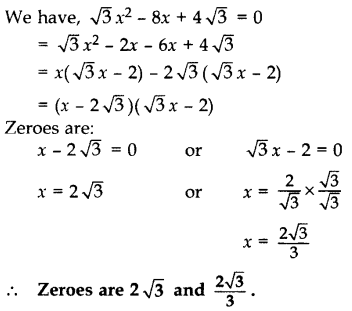
Question 11.
If the zeroes of the polynomial x2 + px + q are double in value to the zeroes of 2x2 - 5x - 3, find the value of p and q.
Year of Question:(2012)
Solution:
We have, 2x2 - 5x - 3 = 0
= 2x2 - 6x + x - 3
= 2x(x - 3) + 1(x - 3)
= (x - 3) (2x + 1)
Zeroes are:
x - 3 = 0 or 2x + 1 = 0
⇒ x = 3 or x = −1/2
Since the zeroes of required polynomial is double of given polynomial.
Zeroes of the required polynomial are:
3 × 2, (−1/2 × 2), i.e., 6, -1
Sum of zeroes, S = 6 + (-1) = 5
Product of zeroes, P = 6 × (-1) = -6
Quadratic polynomial is x2 - Sx + P
⇒ x2 - 5x - 6 .(i)
Comparing (i) with x2 + px + q
p = -5, q = -6
Question 12.
Can (x - 2) be the remainder on division of a polynomial p(x) by (2x + 3)? Justify your answer.
Year of Question:(2016 OD)
Solution:
In case of division of a polynomial by another polynomial, the degree of the remainder (polynomial) is always less than that of the divisor. (x - 2) can not be the remainder when p(x) is divided by (2x + 3) as the degree is the same.
Question 13.
Find a quadratic polynomial whose zeroes are 3+√5/5 and 3−√5/5.
Year of Question:(2013)
Solution:

Question 14.
Find the quadratic polynomial whose zeroes are -2 and -5. Verify the relationship between zeroes and coefficients of the polynomial.
Year of Question:(2013)
Solution:
Sum of zeroes, S = (-2) + (-5) = -7
Product of zeroes, P = (-2)(-5) = 10
Quadratic polynomial is x2 - Sx + P = 0
= x2 - (-7)x + 10
= x2 + 7x + 10
Verification:
Here a = 1, b = 7, c = 10
Sum of zeroes = (-2) + (-5) = 7


Question 15.
Find the zeroes of the quadratic polynomial 3x2 - 75 and verify the relationship between the zeroes and the coefficients.
Year of Question:(2014)
Solution:
We have, 3x2 - 75
= 3(x2 - 25)
= 3(x2 - 52)
= 3(x - 5)(x + 5)
Zeroes are:
x - 5 = 0 or x + 5 = 0
x = 5 or x = -5
Verification:
Here a = 3, b = 0, c = -75
Sum of the zeroes = 5 + (-5) = 0
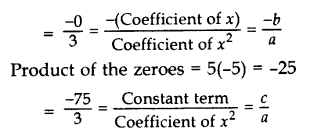
Question 16.
Find the zeroes of p(x) = 2x2 - x - 6 and verify the relationship of zeroes with these co-efficients.
Year of Question:(2017 OD)
Solution:
p(x) = 2x2 - x - 6 .[Given]
= 2x2 - 4x + 3x - 6
= 2x (x - 2) + 3 (x - 2)
= (x - 2) (2x + 3)
Zeroes are:
x - 2 = 0 or 2x + 3 = 0
x = 2 or x = −3/2
Verification:
Here a = 2, b = -1, c = -6
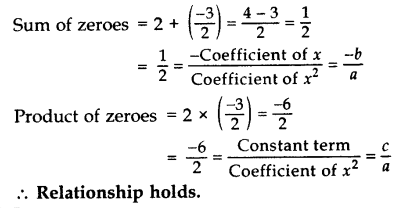
Question 17.
What must be subtracted from the polynomial f(x) = x4 + 2x3 - 13x2 - 12x + 21 so that the resulting polynomial is exactly divisible by x2- 4x + 3?
Year of Question:(2012, 2017 D)
Solution:
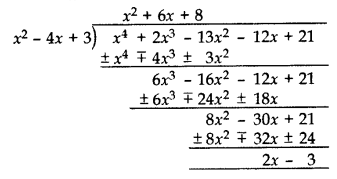
(2x - 3) should be subtracted from x4 + 2x3 - 13x2 - 12x + 21.
Polynomials Class 10 Important Questions Short Answer-II (3 Marks)
Question 18.
Verify whether 2, 3 and 1/2 are the zeroes of the polynomial p(x) = 2x3 - 11x2 + 17x - 6.
Year of Question:(2012, 2017 D)
Solution:
p(x) = 2x3 - 11x2 + 17x - 6
When x = 2,
p(2) = 2(2)3 - 11(2)2 + 17(2) - 6 = 16 - 44 + 34 - 6 = 0
When x = 3, p(3) = 2(3)3- 11(3)2 + 17(3) - 6 = 54 - 99 + 51 - 6 = 0
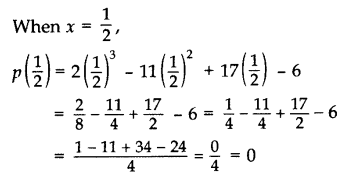
Yes, x = 2, 3 and 1/2 all are the zeroes of the given polynomial.
Question 19.
Show that 12 and −3/2 are the zeroes of the polynomial 4x2 + 4x - 3 and verify the relationship between zeroes and co-efficients of polynomial.
Year of Question:(2013)
Solution:
Let P(x) = 4x2 + 4x - 3
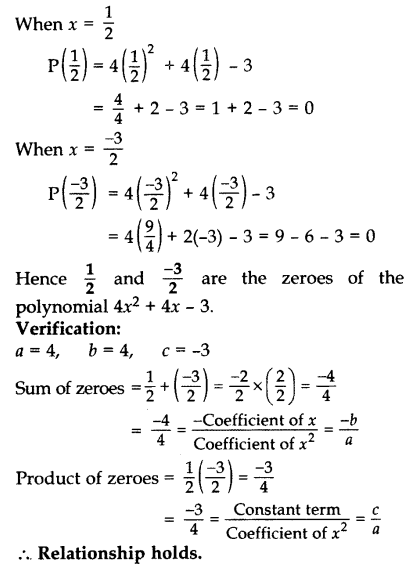
Question 20.
Find a quadratic polynomial, the sum and product of whose zeroes are -8 and 12 respectively. Hence find the zeroes.
Year of Question:(2014)
Solution:
Let Sum of zeroes (α + β) = S = -8 .[Given]
Product of zeroes (αβ) = P = 12 .[Given]
Quadratic polynomial is x2 - Sx + P
= x2 - (-8)x + 12
= x2 + 8x + 12
= x2 + 6x + 2x + 12
= x(x + 6) + 2(x + 6)
= (x + 2)(x + 6)
Zeroes are:
x + 2 = 0 or x + 6 = 0
x = -2 or x = -6
Question 21.
Find a quadratic polynomial, the sum and product of whose zeroes are 0 and −3/5 respectively. Hence find the zeroes.
Year of Question:(2015)
Solution:
Quadratic polynomial = x2 - (Sum)x + Product
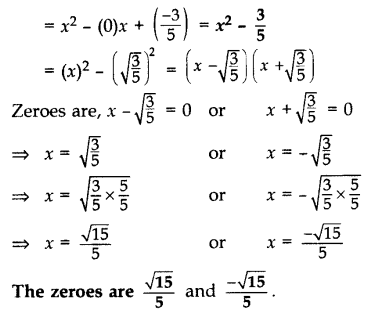
Question 22.
Find the zeroes of the quadratic polynomial 6x2 - 3 - 7x and verify the relationship between the zeroes and the coefficients of the polynomial.
Year of Question:(2015, 2016 OD)
Solution:
We have, 6x2 - 3 - 7x
= 6x2 - 7x - 3
= 6x2 - 9x + 2x - 3
= 3x(2x - 3) + 1(2x - 3)
= (2x - 3) (3x + 1)
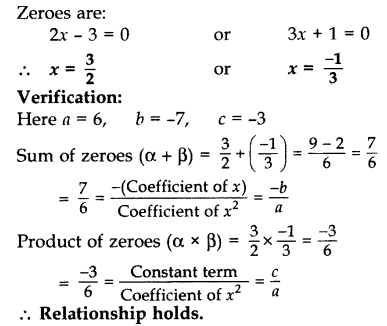
Question 23.
Find the zeroes of the quadratic polynomial f(x) = x2 - 3x - 28 and verify the relationship between the zeroes and the co-efficients of the polynomial.
Year of Question:(2012, 2017 D)
Solution:
p(x) = x2 - 3x - 28
= x2 - 7x + 4x - 28
= x(x - 7) + 4(x - 7)
= (x - 7) (x + 4)
Zeroes are:
x - 7 = 0 or x + 4 = 0
x = 7 or x = -4
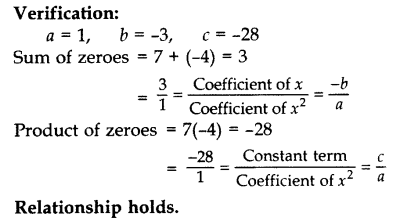
Question 24.
If α and β are the zeroes of the polynomial 6y2- 7y + 2, find a quadratic polynomial whose zeroes are 1/α and 1/α.
Year of Question:(2012)
Solution:
Given: 6y2 - 7y + 2
Here a = 6, b = -7, c = 2
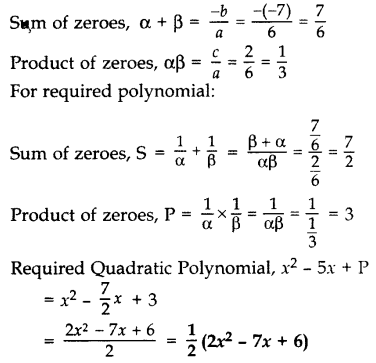
Question 25.
Divide 3x2 + 5x - 1 by x + 2 and verify the division algorithm.
Year of Question:(2013 OD)
Solution:
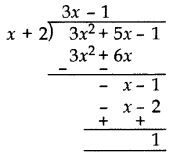
Quotient = 3x - 1
Remainder = 1
Verification:
Divisor × Quotient + Remainder
= (x + 2) × (3x - 1) + 1
= 3x2- x + 6x - 2 + 1
= 3x2 + 5x - 1
= Dividend
Question 26.
On dividing 3x3 + 4x2 + 5x - 13 by a polynomial g(x) the quotient and remainder were 3x +10 and 16x - 43 respectively. Find the polynomial g(x).
Year of Question:(2017 OD)
Solution:
Let 3x3 + 4x2 + 5x - 13 = P(x)
q(x) = 3x + 10, r(x) = 16x - 43 .[Given]
As we know, P(x) = g(x) . q(x) + r(x)
3x3 + 4x2 + 5x - 13 = g(x) . (3x + 10) + (16x - 43)
3x3 + 4x2 + 5x - 13 - 16x + 43 = g(x) . (3x + 10)
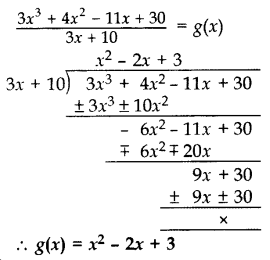
Question 27.
Check whether polynomial x - 1 is a factor of the polynomial x3 - 8x2 + 19x - 12. Verify by division algorithm.
Year of Question:(2014)
Solution:
Let P(x) = x3 - 8x2 + 19x - 12
Put x = 1
P(1) = (1)3 - 8(1)2+ 19(1) - 12
= 1 - 8 + 19 - 12
= 20 - 20
= 0
Remainder = 0
(x - 1) is a facter of P(x).
Verification:

Since remainder = 0
(x - 1) is a factor of P(x).
Polynomials Class 10 Important Questions Long Answer (4 Marks)
Question 28.
Divide 4x3 + 2x2 + 5x - 6 by 2x2 + 1 + 3x and verify the division algorithm.
Year of Question:(2013)
Solution:
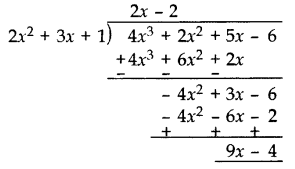
Quotient = 2x - 2
Remainder = 9x - 4
Verification:
Divisor × Quotient + Remainder
= (2x2 + 3x + 1) × (2x - 2) + 9x - 4
= 4x3 - 4x2 + 6x2 - 6x + 2x - 2 + 9x - 4
= 4x3 + 2x2 + 5x - 6
= Dividend
Question 29.
Given that x - √5 is a factor of the polynomial x3- 3√5 x2 - 5x + 15√5, find all the zeroes of the polynomial.
Year of Question:(2012, 2016)
Solution:
Let P(x) = x3 - 3√5 x2 - 5x + 15√5
x - √5 is a factor of the given polynomial.
Put x = -√5,
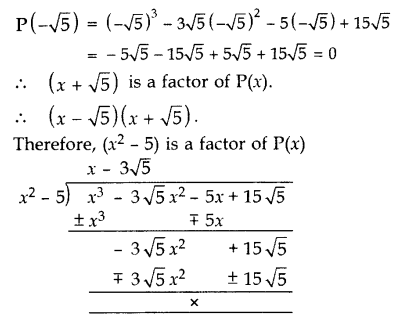
Other zero:
x - 3√5 = 0 ⇒ x = 3√5
All the zeroes of P(x) are -√5, √5 and 3√5.
Question 30.
If a polynomial x4+ 5x3 + 4x2 - 10x - 12 has two zeroes as -2 and -3, then find the other zeroes.
Year of Question:(2014)
Solution:
Since two zeroes are -2 and -3.
(x + 2)(x + 3) = x2 + 3x + 2x + 6 = x2 + 5x + 6
Dividing the given equation with x2 + 5x + 6, we get
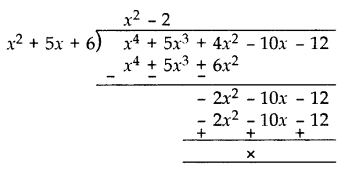
x4 + 5x3 + 4x2 - 10x - 12
= (x2 + 5x + 6)(x2- 2)
= (x + 2)(x + 3)(x - √2 )(x + √2 )
Other zeroes are:
x - √2 = 0 or x + √2 = 0
x = √2 or x = -√2
Question 31.
Find all the zeroes of the polynomial 8x4 + 8x3 - 18x2 - 20x - 5, if it is given that two of its zeroes are √5/2 and −√5/2.
Year of Question: (2014, 2016 D)
Solution:
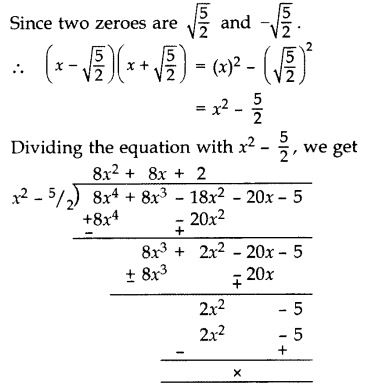
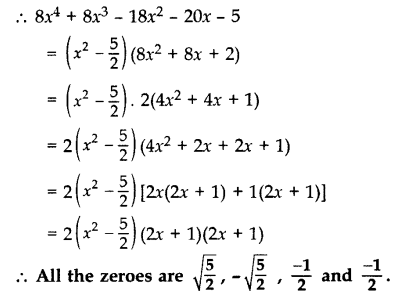
Question 32.
If p(x) = x3 - 2x2 + kx + 5 is divided by (x - 2), the remainder is 11. Find k. Hence find all the zeroes of x3+ kx2 + 3x + 1.
Year of Question:(2012)
Solution:
p(x) = x3 - 2x2 + kx + 5,
When x - 2,
p(2) = (2)3 - 2(2)2 + k(2) + 5
⇒ 11 = 8 - 8 + 2k + 5
⇒ 11 - 5 = 2k
⇒ 6 = 2k
⇒ k = 3
Let q(x) = x3 + kx2 + 3x + 1
= x3 + 3x2 + 3x + 1
= x3 + 1 + 3x2 + 3x
= (x)3 + (1)3 + 3x(x + 1)
= (x + 1)3
= (x + 1) (x + 1) (x + 1) .[∵ a3 + b3 + 3ab (a + b) = (a + b)3]
All zeroes are:
x + 1 = 0 ⇒ x = -1
x + 1 = 0 ⇒ x = -1
x + 1 = 0 ⇒ x = -1
Hence zeroes are -1, -1 and -1.
Question 33.
If α and β are zeroes of p(x) = kx2 + 4x + 4, such that α2 + β2= 24, find k.
Year of Question:(2013)
Solution:
We have, p(x) = kx2 + 4x + 4
Here a = k, b = 4, c = 4
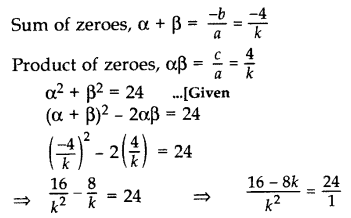
⇒ 24k2 = 16 - 8k
⇒ 24k2 + 8k - 16 = 0
⇒ 3k2 + k - 2 = 0 .[Dividing both sides by 8]
⇒ 3k2 + 3k - 2k - 2 = 0
⇒ 3k(k + 1) - 2(k + 1) = 0
⇒ (k + 1)(3k - 2) = 0
⇒ k + 1 = 0 or 3k - 2 = 0
⇒ k = -1 or k = 2/3
Question 34.
If α and β are the zeroes of the polynomial p(x) = 2x2 + 5x + k, satisfying the relation, α2 + β2 + αβ = 21/4 then find the value of k.
Year of Question:(2017 OD)
Solution:
Given polynomial is p(x) = 2x2 + 5x + k
Here a = 2, b = 5, c = k
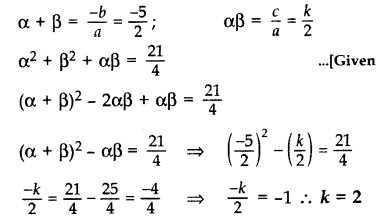
Question 35.
What must be subtracted from p(x) = 8x4 + 14x3 - 2x2 + 8x - 12 so that 4x2 + 3x - 2 is factor of p(x)? This question was given to group of students for working together.
Year of Question:(2015)
Solution:
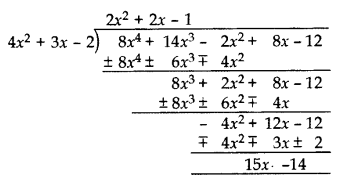
Polynomial to be subtracted by (15x - 14).
Question 36.
Find the values of a and b so that x4 + x3 + 8x2 +ax - b is divisible by x2 + 1.
Year of Question:(2015)
Solution:
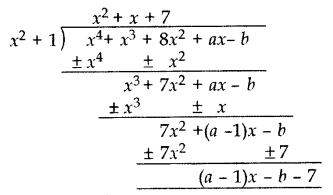
If x4 + x3 + 8x2 +ax - b is divisible by x2 + 1
Remainder = 0
(a - 1)x - b - 7 = 0
(a - 1)x + (-b - 7) = 0 . x + 0
a - 1 = 0, -b - 7 = 0
a = 1, b = -7
a = 1, b = -7
Question 37.
If a polynomial 3x4 - 4x3 - 16x2 + 15x + 14 is divided by another polynomial x2 - 4, the remainder comes out to be px + q. Find the value of p and q.
Year of Question:(2014)
Solution:
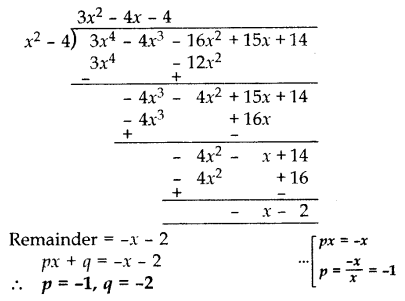
Question 38.
If the polynomial (x4 + 2x3 + 8x2 + 12x + 18) is divided by another polynomial (x2 + 5), the remainder comes out to be (px + q), find the values of p and q.
Year of Question:(2014)
Solution:
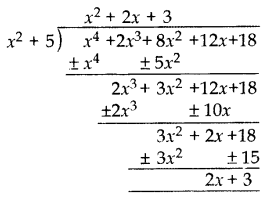
Remainder = 2x + 3
px + q = 2x + 3
p = 2 and q = 3.